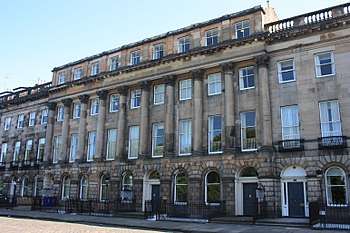Charles Saroléa
Prof Charles Louis-Camille Sarolea FRSE DLitt (24 October 1870 in Tongeren – 11 March 1953 in Edinburgh) was a Belgian philologist and author.[1]
Life

He was born in Tongeren on 24 October 1870 the son of Dr Jean Pierre Sarolea MD. He was educated at Lycee Athenee at Hasselt. He then studied at the University of Liege.
He moved to Edinburgh in 1894 as Head of French at the University of Edinburgh (as Dr Sarolea). He initially lived in a flat at 74 Bruntsfield Place.[2]
In 1903 he was elected a Fellow of the Royal Society of Edinburgh. His proposers were George Chrystal, Alexander Crum Brown, Sir Francis Grant Ogilvie and James Gordon MacGregor.[3] He was also a member of the Scottish Arts Club.
In 1910 he moved to 21 Royal Terrace on Calton Hill. He was an avid book collector, and his library grew to such proportions that he took an adjoining property on the terrace to accommodate it.[4]
He wrote on Russia and edited a library of French authors for the publisher J.M. Dent. From 1912 to 1917 he edited Everyman, a weekly literary magazine favourable to the doctrine of distributism.
In 1915, he was sent by the Belgian government to the United States to support the veracity of atrocity stories in circulation about the German occupation of Belgium. The mission was not a success, in that Sarolea unwisely and publicly attacked the neutrality that the US was observing at the time with respect to World War I.[5] Recent academic interest has been on his political views.
In 1918 he was given his professorship by the University of Edinburgh which he held until retiral in 1931.
He died in Edinburgh on 11 March 1953.
Family
He married twice: firstly in 1895 to Martha van Cauwenberghe, then secondly in 1905 to Julia Dorman.
His niece Marie Antoinette Sarolea married John Bartholomew.[6]
Artistic recognition
His portrait by William Leadbetter Calderwood is held by the University of Edinburgh.[7]
Works
- Henrik Ibsen (1891)
- Essais de philosophie et de literature (1898)
- Les belges au Congo (1899)
- A Short History of the Anti-Congo Campaign (1905)
- The French Revolution and the Russian Revolution (1906)
- Newman's Theology (1908)
- The Anglo-German Problem (1912)
- Count L.N. Tolstoy. His life and work (1912)
- How Belgium Saved Europe (1915)
- The Curse of the Hohenzollern (1915)
- The Murder of Nurse Cavell (1915)
- The French Renascence (1916)
- Europe's Debt to Russia (1916)
- Great Russia Her Achievement and Promise (1916)
- German problems and personalities (1917)
- The Russian revolution and the war (1917)
- The Maid of Orleans: The Story of Joan of Arc Told to American Soldiers (1918)
- Europe and the League of Nations (1919)
- Versailles und der Völkerbund (1920)
- Letters on Polish Affairs (1922)
- Impressions of Soviet Russia (1924)
- Robert Louis Stevenson and France (1924)
- The Policy of Sanctions and the Failure of the League of Nations (1936)
- Daylight on Spain: The Answer to the Duchess of Atholl (1937)
Notes
- Oxford Dictionary of National Biography: Charles Sarolea
- Edinburgh Post Office Directory 1895
- Biographical Index of Former Fellows of the Royal Society of Edinburgh 1783–2002 (PDF). The Royal Society of Edinburgh. July 2006. ISBN 0 902 198 84 X. Archived from the original (PDF) on 4 March 2016. Retrieved 15 May 2018.
- Graves, Charles (1974), Men of Letters, in The Scottish Arts Club, Edinburgh, 1874 - 1974, The Scottish Arts Club, Edinburgh, p. 52.
- This is discussed in this paper (French language, PDF).
- (PDF) http://www.rse.org.uk/wp-content/uploads/2019/03/fells_indexp2.pdf. Missing or empty
|title=(help) - "Charles Saroléa (1870–1953) | Art UK". artuk.org. Retrieved 28 July 2018.
References
- Samantha T. Johnson, Holy war in Europe: Charles Sarolea, Everyman and the First World War, 1914–17 in War and the Media: Reportage and Propaganda, 1900–2003 editors Mark Connelly, David Welch
- Sam Johnson,'Playing the Pharisee'? Charles Sarolea, Czechoslovakia and the road to Munich, 1915–1939, Slavonic and East European review 2004, vol. 82, no.2, pp. 292–314